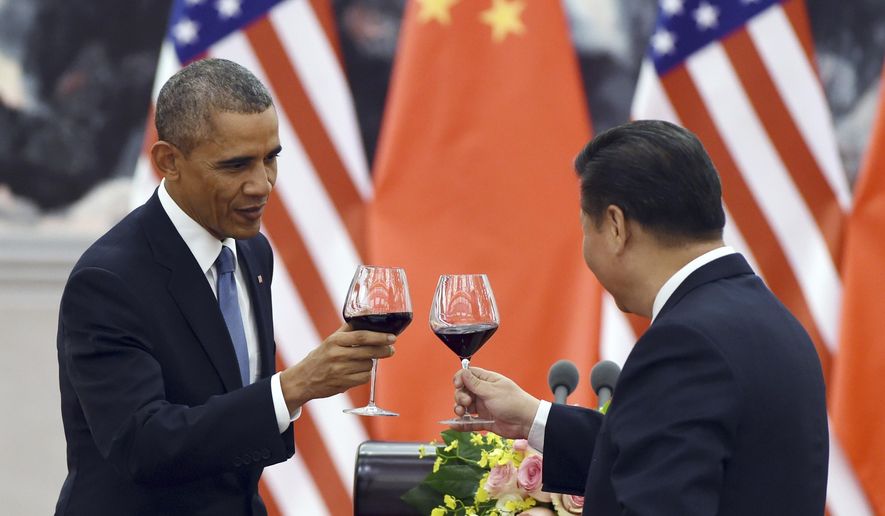The chairman of the Senate Committee on Environment and Public Works denounced on Thursday the anticipated move by President Obama to enter into the Paris climate accord, accusing him of working around Congress on a deal doomed to failure.
Sen. James M. Inhofe, Oklahoma Republican, made his comments based on the widely expected announcement that Mr. Obama and Chinese President Xi Jinping will jointly ratify the Paris Agreement, negotiated in December by 195 nations as part of the U.N. Conference of Parties (COP21).
“This latest announcement is the president attempting to once again give the international community the appearance that he can go around Congress in order to achieve his unpopular and widely rejected climate agenda for his legacy,” Mr. Inhofe said.
His statement comes as the first from Senate Republicans since last week’s report out of China that the presidents would enter into the agreement as early as Friday during Mr. Obama’s trip to China for the G-20 Summit.
“The Senate does not support the Paris Agreement, which is why his administration prefers to not call it a treaty, and the centerpiece of the president’s emission reduction commitments, the Clean Power Plan, is on shaky legal ground, which the United States Supreme Court recently affirmed,” Mr. Inhofe said.
The chairman has argued for months that the White House lacks the authority to join the sweeping climate pact without the two-thirds vote of the Senate required to ratify treaties.
The White House has insisted that the nonbinding agreement is not a treaty and may be ratified by “executive agreement.”
“There is a category of them that are treaties that require advice and consent from the Senate, but there’s a broad category of executive agreements where the executive can enter into those agreements without that advice and consent,” White House senior adviser Brian Deese said at a press conference last week.
Mr. Inhofe predicted the Paris Agreement, which calls on countries to implement policies to reduce greenhouse gas emissions, would meet the same fate as the failed 1997 Kyoto Protocol.
“History already shows that this Paris Agreement will fail,” Mr. Inhofe said. “Half of the countries that were legally bound to the Kyoto Protocol treaty failed to adhere to their pledges, and the host country of Japan even increased their carbon emissions.”
He described the Paris Agreement as a win for China and a loss for the United States. Under the pact China will increase its coal use while the White House “promises unrealistic and economically harmful emissions of up to 28 percent that will send more jobs overseas and reduce our global competitiveness in the marketplace.”
“Now we find ourselves celebrating an agreement where the world’s largest carbon emitter, China, is permitted to increase their emissions until 2025 and to continue bringing a coal-fired power plant online every 10 days,” Mr. Inhofe said. “We even turn a blind eye to the fact that China lied about its carbon emissions when it first came to the table with its pledge last year.
“It’s no wonder Americans will never support this deal,” he added.
Mr. Deese declined to confirm last week a report in the South China Morning Post saying that the Chinese and U.S. presidents plan to ratify together the Paris Agreement, which has struggled to attract supporters.
The accord does not take effect until being ratified by 55 countries responsible for at least 55 percent of emissions, but so far only 23 countries accounting for 1 percent of emissions have finalized the agreement, according to Climate Analytics’ ratification tracker.
The pact is aimed at holding increases in global temperatures to “well below” 2 degrees Celsius from pre-industrial levels.
• Valerie Richardson can be reached at vrichardson@washingtontimes.com.




Please read our comment policy before commenting.